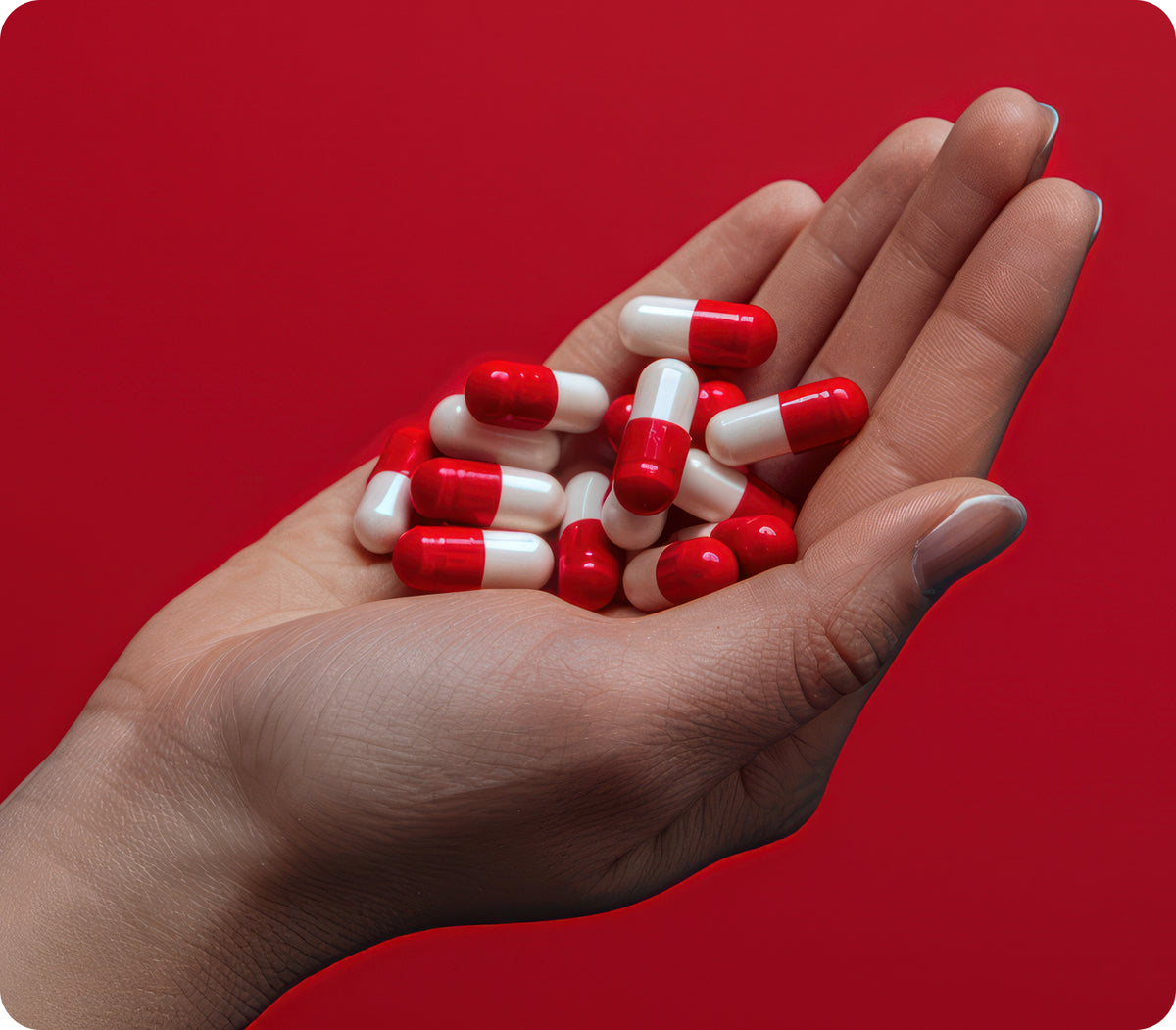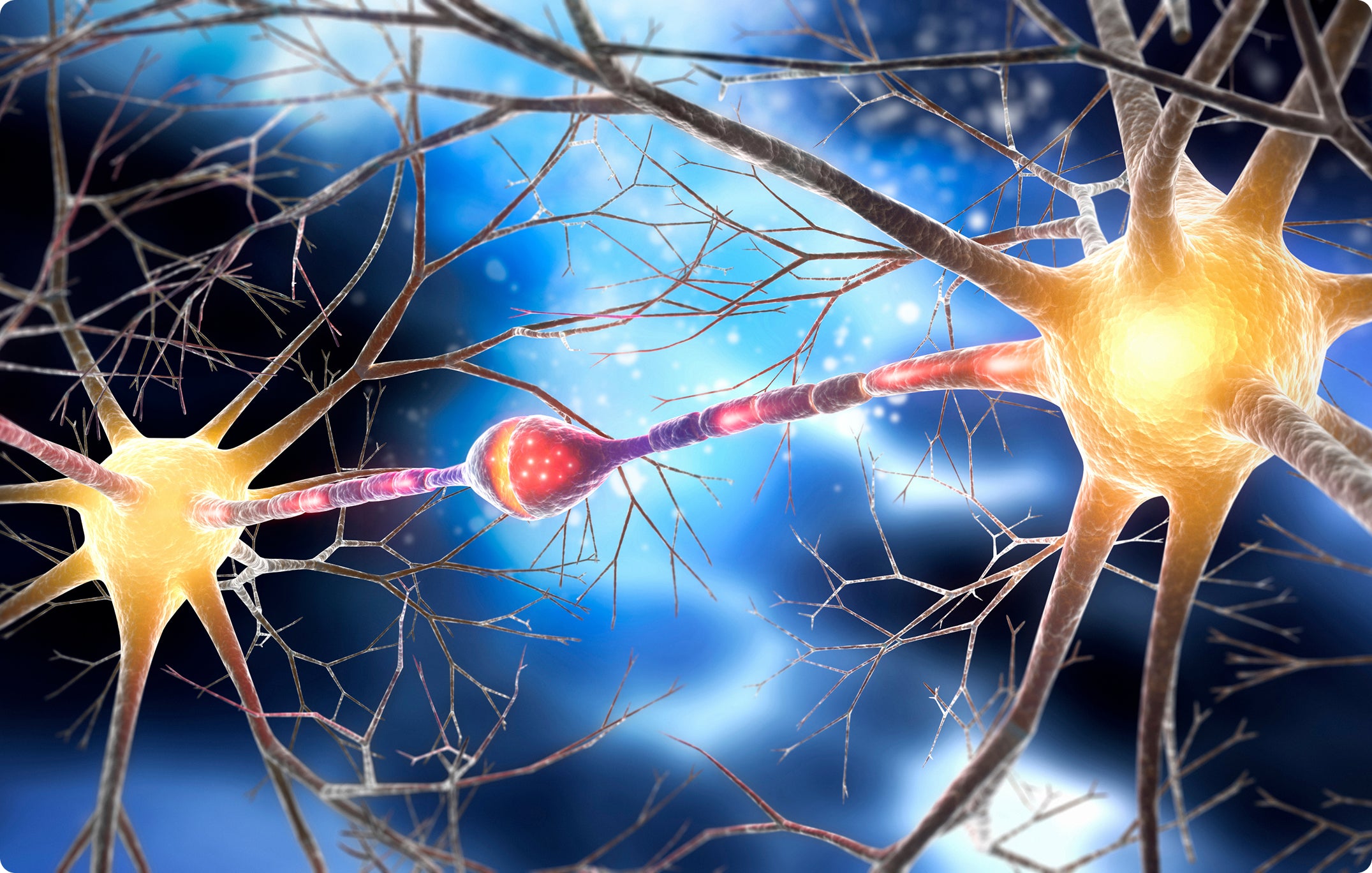Stimulants & Elevated Cortisol
Exploring how stimulants contribute to cortisol, its effect on stress and how targeted interventions can mitigate the damage.
January 10, 2025

What is Cortisol and Why Does It Matter?
This information is for educational purposes only and is not intended as medical advice. Please consult a healthcare professional for any health concerns.
Stimulants are widely known for enhancing alertness and cognitive performance by increasing levels of stimulatory neurotransmitters. However, they also activate the hypothalamic-pituitary-adrenal (HPA) axis, which can result in elevated cortisol levels. Cortisol (also known as the “stress hormone”) is a hormone produced by the adrenal glands - the organs that control our hormones and regulate our stress response, blood pressure, metabolism, etc. - to prime our bodies for immediate threats.4

For example, if a lion is chasing you, cortisol helps send energy to your muscles and increase your heart rate so you can outrun it (or at least try). However, cortisol also suppresses non-urgent functions such as appetite, digestion, reproduction, and immune responses. While this trade-off is beneficial in life-or-death situations (like escaping that lion), consistent activation due to daily stimulant use or constant stress can have lasting adverse effects. Prolonged cortisol elevation has been associated with challenges associated with stress and occasional anxiety, immune and metabolic health, sleep disturbances, weight issues, cardiovascular strain, focus issues, and mood disturbances.3, 6, 8, 17
It’s not just prescription stimulants that spike cortisol either - there have been many studies on humans and animals that confirm that most stimulants, including caffeine, increase stress hormones.1, 26
How Cortisol Stress Affects the Brain and Body

Elevated cortisol poses a pretty severe threat to overall health by contributing to a wide array of health concerns. Approximately 75-90% of doctor visits are related to stress-related issues, including headache, back pain, heart problems, upset stomach, stomach ulcer, sleep problems, tiredness, and accidents. Prolonged stress has also been linked to broader health concerns, including cardiovascular health and maintaining cognitive, immune, and metabolic function. It can even affect sleep quality, which is essential for daily energy and focus.19, 3, 8, 10, 23, 27 For all of the reasons listed above, it’s important to try and maintain healthy cortisol levels and learn to manage stress, as it may contribute to the development and progression of various health concerns and affect overall quality of life.
Neuronal Impact and the Role of Cortisol
Prolonged elevation of cortisol has been associated with increased activity of glutamate receptors, which, in some cases, may contribute to a process known as excitotoxicity. This process can affect neurons and has been linked to changes in the hippocampus, a brain region critical for memory and learning. These changes may be associated with challenges in memory and cognitive function.8 Understanding these connections underscores the importance of managing stress and supporting brain health through lifestyle and wellness practices.
Impact on Neurogenesis and Synaptic Plasticity
Consistent elevation of cortisol has been associated with reduced production of new neurons and decreased synaptic plasticity in the hippocampus. These effects may influence memory formation, learning, emotional regulation, and memory retention.3

Prefrontal Cortex and Cortisol
Elevated cortisol levels may affect the prefrontal cortex, a brain region involved in decision-making, concentration, impulse control, and mood regulation. Cortisol can also influence neurotransmitter activity, including serotonin and dopamine, which play important roles in maintaining a balanced mood. Managing stress is an important part of supporting cognitive function and emotional well-being.10, 23
Metabolic Effects of Cortisol
Elevated cortisol levels are associated with increased blood sugar levels and a tendency to promote abdominal fat storage. Over time, these effects may contribute to weight gain, challenges with insulin sensitivity, and an increased risk of metabolic health concerns. Maintaining a healthy lifestyle, including stress management, balanced nutrition, and regular physical activity, can support metabolic well-being.27
Sleep Disruption
Cortisol elevation can interfere with the body’s natural circadian rhythm, potentially making it harder to fall asleep, stay asleep, or achieve restorative rest. This disruption may reduce sleep quality and lead to daytime fatigue, which can, in turn, influence cognitive function, mood, and overall well-being. Prioritizing healthy sleep habits and stress management can help support better sleep and overall health.27
Immune Function
Elevated cortisol has been linked to changes in immune function, including a reduction in white blood cell production and modulation of inflammatory responses. Therefore, managing stress and supporting healthy cortisol levels can be beneficial for your overall immune health.27
Cardiovascular Issues
High cortisol levels have been associated with factors that can influence cardiovascular health, including blood pressure regulation, lipid metabolism, and arterial health. Research suggests that these associations may contribute to an increased risk of certain conditions, making cortisol a significant factor in cardiovascular health.27
Best Practices for Modulating Cortisol

1. Regular Physical Exercise
- Endorphin Release: Exercise promotes the release of endorphins, which are natural mood lifters. Endorphins can counteract the effects of cortisol, reducing stress and improving mood. Regular physical activity can help normalize the HPA axis activity, leading to a more balanced cortisol release.11, 29
2. Meditation
- Increased Parasympathetic Activity: Meditation increases activity in the parasympathetic nervous system (rest-and-digest response), counteracting the stress response and reducing cortisol.
- Neuroplasticity: Regular meditation can change brain structure and function, enhancing areas involved in emotion regulation and stress reduction areas.9
3. Adequate Sleep
- Circadian Rhythm Regulation: Proper sleep helps maintain a natural circadian rhythm, which regulates cortisol production. Cortisol levels naturally decrease at night and increase in the morning. Quality sleep lowers the overall production of stress hormones, including cortisol. Sleep deprivation, on the other hand, leads to increased cortisol levels.11, 29

4. Breathwork
- Activation of the Parasympathetic Nervous System: Deep breathing and relaxation techniques (such as progressive muscle relaxation) activate the parasympathetic nervous system, reducing the fight-or-flight response and lowering cortisol levels.
- Increased Heart Rate Variability (HRV): Practices like deep breathing increase HRV, which is associated with lower stress and cortisol levels.9, 15
5. Adaptogenic Herbs
- Adaptation to Stress: Herbs like ashwagandha, Rhodiola rosea, and holy basil help the body adapt to stress and reduce cortisol production. They support adrenal gland function and enhance the body’s resilience to stress. Adaptogens work by modulating the activity of the HPA axis, leading to a balanced cortisol response.2, 12, 14, 20, 22
Highlight on Powerful Adaptogens in Stasis
Please note that Stasis is a dietary supplement that helps relieve occasional stress. It is not intended to diagnose, treat, cure, or prevent any disease.

Ashwagandha is a revered adaptogen with centuries of use in Ayurvedic medicine for managing stress and occasional anxiety. It contains active compounds like withanolides, which help balance cortisol levels by modulating the hypothalamic-pituitary-adrenal (HPA) axis. Ashwagandha reduces the activity of stress-related pathways, including the CRH (corticotropin-releasing hormone) signaling, which supports your body’s natural stress response.
By regulating these stress hormones, Ashwagandha promotes a calm mind, enhances resilience to stress, and supports overall emotional well-being.2, 14, 22

Saffron is a potent spice known for its mood-enhancing and stress-reducing properties, driven by bioactive compounds like crocin and safranal. Saffron modulates serotonin levels, critical in mood regulation and stress response. It also helps maintain healthy cortisol levels by influencing the HPA axis, reducing the impact of stress on the body.
Saffron's ability to improve mood, reduce occasional anxiety, and promote relaxation makes it a natural ally in your fight against stress.13, 16, 21
Key Study Summaries
The following information is for educational purposes only and is not intended as medical advice. These statements have not been evaluated by the Food and Drug Administration. This information is not intended to diagnose, treat, cure, or prevent any disease, nor is it intended to promote any specific product.
Stress and Amphetamines
A 2010 study by Hamidovic et al. explored how stress may influence responses to amphetamines in healthy adults. Participants taking d-amphetamine showed increases in cortisol, heart rate, and blood pressure. The study also noted that individuals with stronger cortisol and mood responses to stress tended to report greater positive mood effects from the drug. These findings suggest a potential connection between stress reactivity and stimulant response, though further research is needed to understand these interactions fully.5
Caffeine: Your Workday Stress Multiplier
That coffee you sip at work? It’s subtly intensifying your body's stress response. Lane, 2002 found that caffeine caused a 4/3 mmHg rise in blood pressure and a 32% increase in urinary epinephrine levels, persisting both at work and at home. These effects highlight caffeine’s role in amplifying the physiological toll of daily stress, making your 9-to-5 grind a bit tougher on the body than you might realize.10
Amphetamines, Cortisol, and Mental Health
A 1980 study by Sachar et al. observed differing cortisol responses to amphetamines between healthy individuals and those with depression. Healthy participants experienced cortisol increases of up to 35% within 30 minutes, while the response in depressed patients was significantly blunted, suggesting differences in how mental health conditions may affect the HPA axis. These findings provide insights into how stimulant effects may vary across populations.18
Stimulants and Cortisol
A review by Subramaniam et al. (2019) explored how different psychotropic medications influence cortisol, a key stress hormone. The findings suggest stimulants, such as amphetamines, may increase or maintain baseline cortisol levels, reflecting activation of the body’s stress-response system. In contrast, antidepressants and antipsychotics often show a reduction in cortisol levels. These observations underline the distinct ways these medications interact with the stress-response axis, offering valuable insights into their physiological effects.24
-
- al'Absi, M., Lovallo, W. R., McKey, B., Sung, B. H., Whitsett, T. L., & Wilson, M. F. (1998). Hypothalamic-pituitary-adrenocortical responses to psychological stress and caffeine in men at high and low risk for hypertension. Psychosomatic Medicine, 60(4), 521-527. https://doi.org/10.1097/00006842-199807000-00021
- The following information is for educational purposes only and is not intended as medical advice. These statements have not been evaluated by the Food and Drug Administration. This information is not intended to diagnose, treat, cure, or prevent any disease, nor is it intended to promote any specific product.
- Chandrasekhar, K., Kapoor, J., & Anishetty, S. (2012). A prospective, randomized double-blind, placebo-controlled study of safety and efficacy of a high-concentration full-spectrum extract of ashwagandha root in reducing stress and anxiety in adults. Indian Journal of Psychological Medicine, 34(3), 255-262. https://doi.org/10.4103/0253-7176.106022
- Childs, E., Bershad, A. K., & de Wit, H. (2016). Effects of D-amphetamine upon psychosocial stress responses. Journal of Psychopharmacology, 30(7), 608-615. https://doi.org/10.1177/0269881116650388
- Cleveland Clinic. (2024, May 1). Cortisol: What it is, function, symptoms & levels. https://my.clevelandclinic.org/health/articles/22187-cortisol
- Hamidovic, A., Childs, E., Conrad, M., King, A., & de Wit, H. (2010). Stress-induced changes in mood and cortisol release predict mood effects of amphetamine. Drug and Alcohol Dependence, 109(1-3), 175-180. https://doi.org/10.1016/j.drugalcdep.2009.12.029
- Hirotsu, C., Tufik, S., & Andersen, M. L. (2015). Interactions between sleep, stress, and metabolism: From physiological to pathological conditions. Sleep Science, 8(3), 143-152. https://doi.org/10.1016/j.slsci.2015.09.002
- Kholif, E. Y., Awad, S. M., Attia, N. M., & Tawhid, Z. E. (2021). Effect of one-month treatment with methylphenidate on salivary cortisol level of attention deficit hyperactivity disorder children. Middle East Current Psychiatry, 28, 11. https://doi.org/10.1186/s43045-021-00091-y
- Koncz, A., Demetrovics, Z., & Takacs, Z. K. (2020). Meditation interventions efficiently reduce cortisol levels of at-risk samples: A meta-analysis. Health Psychology Review, 15(1), 56-84. https://doi.org/10.1080/17437199.2020.1760727
- Lane, J. D. (2002). Caffeine affects cardiovascular and neuroendocrine activation at work and home. Psychosomatic Medicine, 64(4), 595-603. https://doi.org/10.1097/01.psy.0000021946.90613.db
- Lastella, M., Trabelsi, K., & Romdhani, M. (2024). Editorial: The physiological relationship between sleep and exercise. Frontiers in Physiology, 15. https://doi.org/10.3389/fphys.2024.1419268
- Liao, L., He, Y., Li, L., Zhang, L., Zeng, H., He, M., Wu, B., & Yang, H. (2018). A preliminary review of studies on adaptogens: Comparison of their bioactivity in TCM with that of ginseng-like herbs used worldwide. Chinese Medicine, 13(1). https://doi.org/10.1186/s13020-018-0214-9
- Lopresti, A. L., & Drummond, P. D. (2014). Saffron (Crocus sativus) for depression: A systematic review of clinical studies and examination of underlying antidepressant mechanisms of action. Human Psychopharmacology, 29(6), 517-527. https://doi.org/10.1002/hup.2434
- Lopresti, A. L., & Drummond, P. D. (2017). Efficacy of ashwagandha (Withania somnifera) extract in reducing stress and anxiety: A systematic review. Journal of Clinical Medicine, 6(7), 56. https://doi.org/10.3390/jcm6070056
- Moszeik, E. N., von Oertzen, T., & Renner, K.-H. (2020). Effectiveness of a short yoga nidra meditation on stress, sleep, and well-being in a large and diverse sample. Current Psychology, 41(8), 5272-5286. https://doi.org/10.1007/s12144-020-01042-2
- Pérez-Sánchez, A., Barrajón-Catalán, E., Herranz-López, M., & Micol, V. (2018). Nutraceuticals for neurodegenerative diseases: Mechanism of action and current evidence. Current Neuropharmacology, 16(7), 895-926. https://doi.org/10.2174/1570159X15666171109123006
- Pulopulos, M. M., Hidalgo, V., Puig-Perez, S., Montoliu, T., & Salvador, A. (2020). Relationship between cortisol changes during the night and subjective and objective sleep quality in healthy older people. International Journal of Environmental Research and Public Health, 17(4), 1264. https://doi.org/10.3390/ijerph17041264
- Sachar, E. J., Asnis, G., Nathan, R. S., Halbreich, U., Tabrizi, M. A., & Halpern, F. S. (1980). Dextroamphetamine and cortisol in depression: Morning plasma cortisol levels suppressed. Archives of General Psychiatry, 37(7), 755-757. https://doi.org/10.1001/archpsyc.1980.01780200033003
- Salleh, M. R. (2008). Life event, stress and illness. Malaysian Journal of Medical Sciences, 15(4), 9-18.
- Sampath, S., Mahapatra, S. C., Padhi, M. M., Sharma, R., & Talwar, A. (2015). Holy basil (Ocimum sanctum Linn.) leaf extract enhances specific cognitive parameters in healthy adult volunteers: A placebo controlled study. Indian Journal of Physiology and Pharmacology, 59(1), 69-77.
- Siddiqui, S. A., Redha, A. A., Snoeck, E. R., Singh, S., Simal-Gandara, J., Ibrahim, S. A., Jafari, S. M., El-Hack, M. E. A., Mahomoodally, M. F., Bhia, M., Sathasivam, K., & Ponnusamy, K. (2022). Anti-depressant properties of crocin molecules in saffron. Molecules, 27(7), 2076. https://doi.org/10.3390/molecules27072076
- Singh, N., Bhalla, M., de Jager, P., & Gilca, M. (2011). An overview on ashwagandha: A Rasayana (rejuvenator) of Ayurveda. African Journal of Traditional, Complementary and Alternative Medicines, 8(5 Suppl), 208-213. https://doi.org/10.4314/ajtcam.v8i5S.9
- Strajhar, P., Vizeli, P., Patt, M., Huber, A., Kratschmar, D. V., Liechti, M. E., & Odermatt, A. (2019). Effects of lisdexamfetamine on plasma steroid concentrations compared with D-amphetamine in healthy subjects: A randomized, double-blind, placebo-controlled study. The Journal of Steroid Biochemistry and Molecular Biology, 186, 212-225. https://doi.org/10.1016/j.jsbmb.2018.10.016
- Subramaniam, A., LoPilato, A., & Walker, E. F. (2019). Psychotropic medication effects on cortisol: Implications for research and mechanisms of drug action. Schizophrenia Research, 213, 6-14. https://doi.org/10.1016/j.schres.2019.06.023
- van Kammen, D. P., & Schulz, S. C. (1985). d-Amphetamine raises cortisol levels in schizophrenic patients with and without chronic naltrexone pretreatment. Journal of Neural Transmission, 64, 35-43. https://doi.org/10.1007/BF01259343
- Wachtel, S. R., Charnot, A., & de Wit, H. (2000). Acute hydrocortisone administration does not affect subjective responses to D-amphetamine in humans. Psychopharmacology, 153(3), 380-388. https://doi.org/10.1007/s002130000599
- Wang, L.-J., Huang, Y.-S., Hsiao, C.-C., & Chen, C.-K. (2016). The trend in morning levels of salivary cortisol in children with ADHD during 6 months of methylphenidate treatment. Journal of Attention Disorders, 21(3), 254-261. https://doi.org/10.1177/1087054712466139
- Weyandt, L. L., White, T. L., Gudmundsdottir, B. G., Nitenson, A. Z., Rathkey, E. S., De Leon, K. A., & Bjorn, S. A. (2018). Neurocognitive, autonomic, and mood effects of Adderall: A pilot study of healthy college students. Pharmacy, 6(3), 58. https://doi.org/10.3390/pharmacy6030058
- Xie, Y., Liu, S., Chen, X.-J., Yu, H.-H., Yang, Y., & Wang, W. (2021). Effects of exercise on sleep quality and insomnia in adults: A systematic review and meta-analysis of randomized controlled trials. Frontiers in Psychiatry, 12. https://doi.org/10.3389/fpsyt.2021.664499
- Zhang, L., Yu, H., Zhao, X., Lin, X., Tan, C., Cao, G., & Wang, Z. (2022). Salidroside exerts antidepressant-like action by promoting adult hippocampal neurogenesis through SIRT1/PGC-1α signaling. Acta Neuropsychiatrica, 34(1), 1-10. https://doi.org/10.1017/neu.2021.24
- Zheng, T., Wang, H., Chen, Y., Liu, B., Wang, L., Wu, P., & Liu, J. (2022). Therapeutic potential and molecular mechanisms of salidroside in ischemic diseases. Frontiers in Pharmacology, 13, 974775. https://doi.org/10.3389/fphar.2022.974775
- Zhong, Z. F., Han, J., Zhang, J. Z., Xiao, Q., Chen, J. Y., Zhang, X. F., Chen, L. D., & Wu, J. Y. (2022). Salidroside inhibited cerebral ischemia/reperfusion-induced oxidative stress through activating the Nrf2/Trx1 axis-mediated antioxidant effects. Metabolic Brain Disease, 37(2), 437-448. https://doi.org/10.1007/s11011-022-01061-x
